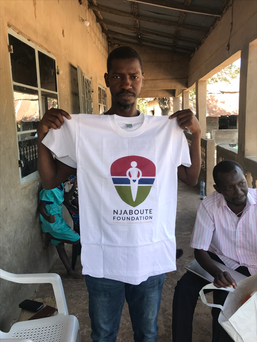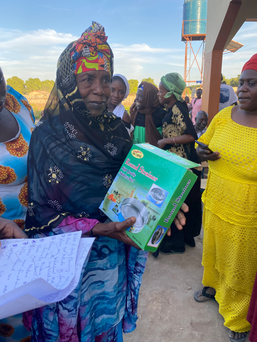Stories From the Field: Family Planning in Mamuda
- Christopher Hyde

- Feb 8, 2023
- 5 min read
In January of 2023, the Njaboute Foundation Traveled to Mamuda to host a family planning seminar/bantaba.

As part of our commitment to hold regular events in the Gambia, at the start of this year we organised a Family Planning seminar and bantaba (community discussion) in the village of Mamuda in western Gambia. Mamuda is around a one hour drive from the capital of the Gambia, Banjul. The Swedish branch of the charity was heavily involved in the event, with several of our board members (Abdoulie and Katarina) traveling to the Gambia and got to see the effect of our work in person.
I had a chat with Katarina, our CFO, about her time in Mamuda and experiences of the women in the village. I wanted to document that experience here, in our online blog, to show our members the effect of our work.
Chris: "Why did we decide to hold an event in Mamuda and why did you decide to attend in person this time?"
Katarina: "My holidays were coming up and I decided that I wanted to visit Abdoulie and his family in the Gambia. While there it also made sense to meet with the Gambian side of our organisation and see some of the work they were doing. It was a lot of fun to be on site and to be a part of what our organization is achieving there."
"That's when we decided to hold an event, we had talked about it a little before we left Sweden, but really it was more of a spontaneous decision. We chose Mamuda because it is one of most vulnerable communities in terms of access to health care. We decided that family planning and information on family planning techniques would be the topic."
Most people in Mamuda don’t believe in family planning. There are records that show poor uptake of family planning services. They believe that women must take permission before they can take contraceptives.

"Our aim was to present a seminar, followed by a question and answer session (bantaba), a quiz with questions about what we talked about, and of course there would be food."
Chris: "I understand the need for some food, that always brings out the crowds! How did yourself and Abdoulie set up the event with the village?"
Katarina: "Abdoulie contacted the village development committee in Mamuda and we went there and agreed on the time and place and how it would be done. The village prepared a large tent and made sure that food was prepared in large loads for all participants. we went to the market in Brikama to buy prizes for the Quiz! Baskets, bowls, cooking pots, laundry items and more. So much fun and quite different from Sweden. But that is what traveling is for (at least for me)"
Chris: "It's great to see that our field supervisors and local volunteers/contacts in the Gambia help make setting up these events simple. How did things go on the day?"
Katarina: "On the big day, we went there quite early, we expected the preparations to take some time. The tent for the participants was in already place with some tables for us as well. We came with the prizes, juice that Abdoulie's wife had made and ourselves of course. Apart from us, there were two journalists there to cover the event. I snuck into the back of the new Health Center for a little reconnaissance and there the cooking was in full swing. I got to come into the yard and watch for a while during the preparations. Hot food and a really hot day."

Chris: "What about the event itself? What impact did we have on those attending?"
Katarina: "I could see that the message seemed to get through, there were a lot of questions and discussion with the participating women. Many women (and some men) had come to listen to what Peter and Abdoulie had to say. There was an interpreter to help everyone attending understand our message."
Abstinence is one of the most common forms of 'contraception' in Mamuda. Traditional contraceptives are also popular as they are not invasive compared to modern methods (that are inserted, injected or implanted into the body). Typically these are charms, "Jujus" or herbs, which are either tied around their waist, swallowed or placed by the bedside of couples.
Topics discussed as part of the Seminar and discussion included:
A presentation surrounding traditional contraceptive methods as a substitute to modern practice. How modern advances in medicine and methods have improved the contraceptive process.
Modern methods and side effects and what to expect in terms of effectiveness. This was also used to address common concerns and rumors over the effects of contraceptives.
Journalists documented this event as it occurred. This is where Katarina provided a fantastic quote to GAINKO - Guardianship and Independence, which you can see on their website.
"Family Planning is very important because it helps women from having health complications, it will also help women to take care of their children properly." - Katarina Östling
Quote Taken from the GAINKO website: https://gainako.com/njaboute-foundation-engages-mamuda-community-on-family-planning-methods/?fbclid=IwAR0e50d5TZSmFKCIH_Pms7iX8K6mP4ZWOMFDRLyy6wHdZk7kdYp4poL376U
"We ended the event with a Quiz, which was very much appreciated. I had the great honor of presenting the awards. And last but not least, food was served to all participants."
"We left feeling quite satisfied with the whole thing. For me it was a fantastic experience to have been given the opportunity to be a part of this event. - I almost forgot! There was spontaneous dancing at the end too, so much fun!"

Chris: "Dancing? I hope you have a video of that!"
And I am happy to say that she did, check the end of the blog for that.
One of the key points learned from this session, was the effect that bantaba (community discussion) and the quiz had on attendees. Women in particular participated in both the group discussion and quiz sessions. We had input from women on both traditional and modern contraceptive methods including their side effects and treatment. The quiz was very popular - to the point of creating a chaotic atmosphere!
Another lesson learned is the lack of statistics on contraceptive knowledge in Mamuda. When researching Mamuda after the visit, it became clear that research is required into the community to understand what needs our future attention. Record keeping, journalism and statistical analysis in the Gambia remains challenging, with a large proportion of studies conducted by non-residents.
We would like to change this, which is why we place a focus on conducting research driven by Gambian nationals and residents. Who better to understand the issues of the Gambia than those who live there?
Perhaps we will return to Mamuda in the future but for now, I will leave you with a gallery of the photos Katarina took and a sneak preview of her dancing skills!
Great dancing Katarina!
Thank you again for your continued support.

Christopher Hyde
Vice Chairperson
Njaboute Foundation









































Comments